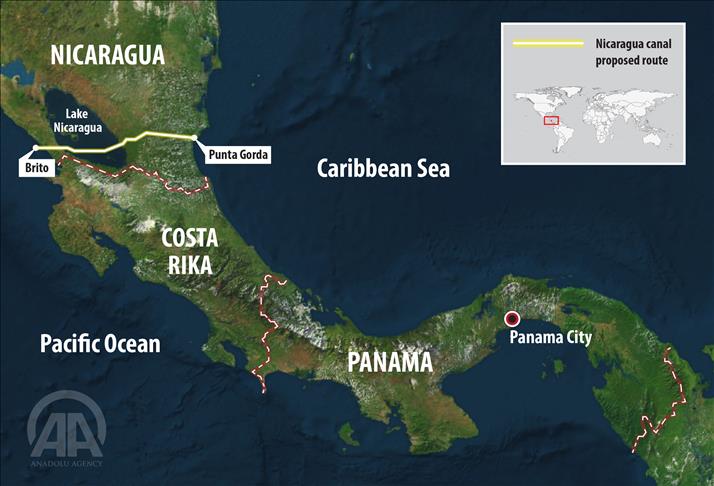
By Sandra Cuffe
MANAGUA, Nicaragua
A symbolic inauguration ceremony was held Monday in the southern department of Rivas to mark the beginning of Grand Interoceanic Canal, amid ongoing protests around the country.
“Today marks the start of the construction projects that will later bring about the beginning of construction of this great, majestic work known as the Grand Canal,” said Vice President Moisés Omar Halleslevens Acevedo.
Before construction can begin on the $50 billion 173-mile shipping channel, Chinese billionaire Wang Jing’s HKND Group will build access roads and other supporting infrastructure.
The canal project concession includes a free trade zone, an international airport, two ports, a tourism complex, concrete and steel plants, and an artificial lake.
The canal has been the subject of controversy and increasing protests in recent months. Nicaraguan environmental, indigenous and community development groups organized under the Cocibolca Group banner on Monday highlighted their concerns.
“What they’re announcing today is just another show,” said Rosario Saenz, the executive director of FUNDENIC, or the Nicaraguan Foundation for Sustainable Development.
The project is moving forward despite the fact that no official environmental impact studies, feasibility studies or social impact assessments have been approved or made public. The Cocibolca Group organizations wrote to Wang Jing and Nicaraguan President Daniel Ortega four months ago, offering to review and comment on environmental and other studies.
“To date, we haven’t received a response from the government or from the company,” said Victor Campos, assistant director of the Humboldt Center, a Nicaraguan environmental NGO.
The Cocibolca Group has organized 20 public forums around the country to present the available information and discuss the potential impacts of the canal, which would bisect the country. The shipping route would cut through communities, protected areas, indigenous territories, rainforest, and Lake Cocibolca, the second largest lake in Latin America.
Sharing information is the group’s principal mission, said Saenz. “As citizens, we should all be informed,” she said.
The ground-breaking ceremony in Rivas and inauguration celebrations in Managua went ahead despite ongoing protests in areas along the planned canal route.
“Right now there are two roadblock actions,” said Monica Baltodano, president of the Popol Na Foundation, an organization focused on local development, citizen participation, and social change. Local residents organized in land defense committees have been demonstrating day and night in El Tule, in the Rio San Juan department, and Nueva Guinea, in the Southern Atlantic Autonomous Region.
“The community members have been out there for five days already,” said Baltedano.
Residents in several communities slated for relocation in order to make way for the canal maintain that if they need to, they will defend their lands by any means necessary.
Anadolu Agency website contains only a portion of the news stories offered to subscribers in the AA News Broadcasting System (HAS), and in summarized form. Please contact us for subscription options.

